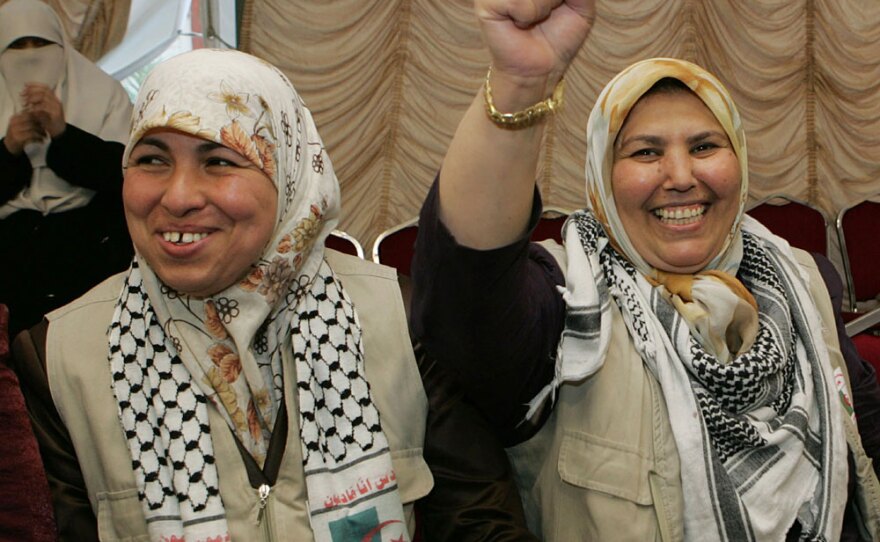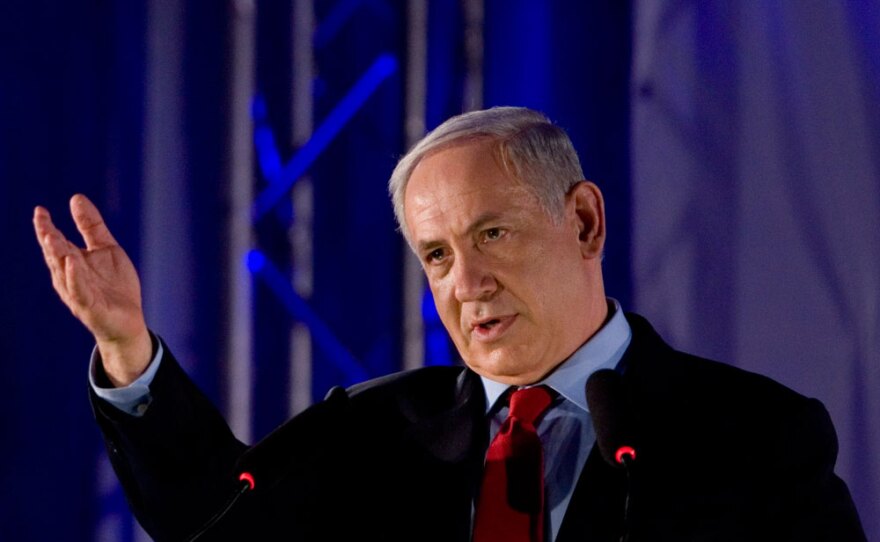Israeli Prime Minister Benjamin Netanyahu defended his nation's blockade of Gaza on Wednesday and said missiles would be smuggled into the Palestinian territory from Iran if the embargo is lifted.
Netanyahu called the growing international criticism over Israel's deadly raid on a Gaza-bound aid flotilla "an attack of international hypocrisy" and accused the pro-Palestinian activists aboard of supporting terrorism.
"If the blockade had been broken, it would have been followed by dozens, hundreds of boats," he said. "Each boat could carry dozens of missiles."
Israeli commandos killed nine activists on the largest ship in the convoy, the Turkish-flagged Mavi Marmara, which the prime minister said housed a "group of extremists."
"That was not a 'Love Boat,' " he said in Hebrew through a translator, adding that the six ships constituted "a flotilla of terror supporters."
Netanyahu's brief televised remarks followed an announcement by the Israeli government that it was deporting all of the 700 activists detained during the raid. Attorney General Yehuda Weinstein said authorities had decided not to prosecute any of the foreign activists, including about 50 who allegedly attacked the commandos who boarded the ships.
"Keeping them here would do more damage to the country's vital interests than good," Weinstein said.
Four Arab-Israeli activists remain in custody, however, and could face charges.
The Israeli Foreign Ministry also said three other activists -- from Ireland, Australia and Italy -- remained in detention over "documentation and other issues."
Activists Complain Of Ill Treatment In Detention
Hundreds of activists deported from Israel returned to a hero's welcome in Turkey early Thursday. Also on the planes were the bodies of the nine dead.
Earlier, scores of activists from Jordan, Kuwait, Pakistan, Malaysia, Indonesia and other countries were bused across the border, arriving in Jordan early Wednesday after a 10-hour wait in Israel to be deported. They were headed to Amman for rest and repatriation to their home countries.
Ambassadors from the various countries were on hand to receive the activists and facilitate their travel home.
A number of the activists complained of ill treatment during their time in Israeli detention and said they had been deprived of basic necessities.
"The Israelis roughed up and humiliated all of us — women, men and children," said Kuwaiti lawmaker Walid al-Tabtabai, who was onboard one of the ships with other activists from Muslim countries.
Algerian Izzeddine Zahrour said Israeli authorities "deprived us of food, water and sleep, and we weren't allowed to use the toilet."
One Eyewitness' Account
Video of the flotilla raid released by the Israeli army showed commandos being met on deck by angry activists after having rappelled to the deck from helicopters. One soldier was thrown overboard while others jumped in the water to escape.

Israeli authorities said the activists wielded knives, clubs and two pistols wrested from soldiers. The commandos were armed with paint guns -- normally used as a nonlethal crowd-control tactic — and said they had been ordered to use their pistols only as a last resort.
Tel Aviv's version of events contradicted many eyewitness accounts, with each side blaming the other for starting the violence.
Former U.S. Ambassador Edward Peck was onboard a Greek-flagged ship in the flotilla and told NPR that he was disappointed at how the situation "unraveled." He said the Israeli naval commandos approached before dawn aboard inflatable boats and were armed with paint guns "as well as pistols, automatic rifles, stun grenades and pepper spray."
"There was just enough time to get a small passive resistance effort started, try to keep them out of the wheelhouse and away from the engine room," he said. "Some people got roughed up, punched and kicked and arms twisted, some cuts and bruises and things along that line."
The activists had expected to meet some resistance from Israeli forces, but not until the flotilla had left in international waters, Peck said. They also had discussed what to do if Israeli forces boarded the vessel.
"We talked about how to react nonviolently, because the last thing you want to do is provoke armed soldiers," Peck said.
Israel has accused the Istanbul-based Foundation for Human Rights and Freedoms and Humanitarian Relief, which helped organize the flotilla, of fomenting the violence. Israel has banned the group, claiming it has close ties with Hamas -- a charge the charity denies.
Asked about Israel's accusations, Peck said: "I'd be very surprised if they didn't make that charge."
"Even if it had been a boatload of clergy, you know, that's what they have to do," he said. "That defends and explains what they've done, that these people were linked to Hamas and all the rest of it."
"It's entirely possible that that's the case, but that was certainly not the intent of the group," he said, adding that: "I cannot speak for anyone on that trip except me and the people I was associated with in going over there."
In Washington, U.S. State Department spokesman P.J. Crowley told reporters that "we know that IHH representatives have met with senior Hamas officials in Turkey, Syria, and Gaza over the past three years. That is obviously of great concern to us."
Turkey Re-Evaluates Ties With Israel
Israel has come under harsh international condemnation for the raid.
The U.N. Human Rights Council condemned what it called Israel's "outrageous attack" on the aid ship and demanded an independent investigation.
Turkey lent support to the flotilla, and at least four of the nine killed were Turkish. Ankara branded the raid a "massacre," and Israel later expelled the families of Turkey's diplomats.
The Turkish Parliament in Ankara held a heated debate Wednesday on whether to impose military and economic sanctions on Israel. Lawmakers of Prime Minister Recep Tayyip Erdogan's ruling Justice and Development Party objected to the measures, apparently anxious to avoid aggravating the situation, but eventually agreed on a declaration that was approved by a show of hands.
The lawmakers said Israel must formally apologize for the raid, pay compensation to the victims and bring those responsible to justice. "This attack was an open violation of United Nations rules and international law," Deputy Parliament Speaker Guldal Mumcu said, reading out the declaration.
Israel maintains it was within its rights to confront the flotilla.
Myron Nordquist, a professor of international law at the University of Virginia, told NPR's Robert Siegel that both cases have merits.
"Frankly, they're both right and they're both wrong," Nordquist said. "They're both right in the sense that if you're taking the point of view that this is a freedom of navigation issue under the 1982 Law of the Sea convention, which prevails in times of peace, then what ... [Turkey] said is true.
"On the other hand, ... [Israel] is assuming that they are talking about a period of armed conflict."
The flotilla incident has created an awkward diplomatic situation for the U.S., which is allied with both Turkey and Israel. Turkish Foreign Minister Ahmet Davutoglu met with U.S. Secretary of State Hillary Clinton on Tuesday in Washington.
"As allies, we have to be honest and sincere to each other, and of course we expect full solidarity with us," Davutoglu said. "It should not be seen like a choice between Turkey and Israel. No. It should be a choice between right and wrong. Between legal and illegal."
Davutoglu had been in Washington to discuss the possibility of Turkey helping to broker a peace deal between Israel and Syria, but in the aftermath of the flotilla raid it would be hard to convince Syria that Israel wants peace.
Clinton said the situation in Gaza was "unsustainable and unacceptable" but acknowledged the need to balance "Israel's legitimate security needs" with the Palestinians' "legitimate needs for sustained humanitarian assistance and regular access for reconstruction materials."
Martin Indyk of the Brookings Institution, a former U.S. ambassador to Israel, told NPR that Washington faced the simultaneous challenge of "having to keep the beginnings of a peace process on track and having to manage Israeli-Turkish relations."
"There's a real need for some kind of triage here in order to stop the hemorrhaging and try to get back to the focus on negotiations," Indyk said, adding that there was a need for Israel to rethink its policy of isolating Gaza.
Robert Malley of the International Crisis group agreed that a change is necessary.
"That means finding an arrangement whereby Gaza will be open to the outside world for both imports and exports," he told NPR. "And that a mechanism is in place so that you minimize the risk of any arms smuggling, and so that you reduce the incentive that Hamas has to try to disrupt and to spoil whatever the U.S. and others are trying to do."
Peter Kenyon, Michelle Kelemen, Sheera Frenkel, Dale Gavlak and Linda Gradstein contributed to this report.
Copyright 2022 NPR. To see more, visit https://www.npr.org. 9(MDAzMjM2NDYzMDEyMzc1Njk5NjAxNzY3OQ001))






